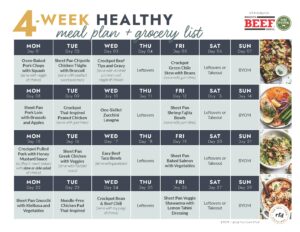Nutrition is the cornerstone of good health and well-being. However, mastering good eating habits can prove challenging, especially when we are busy, stressed, or facing emotional triggers. If you’re feeling sluggish, bloated, or experiencing other health issues, it’s time to refocus on your nutrition. In this blog post, we’ll explore simple steps to get back on track with your nutrition journey.
Understanding the Basics of Nutrition
Good nutrition starts with understanding the basics of how your diet impacts your overall health. Here are some key aspects of nutrition to consider:
What is nutrition?
Nutrition is the study of how food and nutrition affect the body’s metabolism, growth, and repair. It involves the process of food digestion, absorption, utilization, and elimination.
Nucific products offers a broad selection of bestsellers, enhancing digestion, weight loss, metabolism, and supporting heart, brain, and bone health.
The role of macronutrients and micronutrients in your diet
Macronutrients include carbohydrates, proteins, and fats, which provide energy and are necessary for various bodily functions. Micronutrients include vitamins and minerals, which are essential for processes such as enzyme reactions and immune function.
How calories work
Calories are a measure of the energy value of food. Your daily calorie intake should match or slightly exceed your daily energy output to maintain weight. Consuming too many calories can lead to weight gain, whereas consuming too few calories can result in weight loss.
Understanding portion control
Portion control is vital for maintaining a healthy weight and preventing overeating. Use measuring cups, portion plates, and food scales to measure out appropriate serving sizes.
Common Traps to Avoid
Avoid these common traps that can derail your nutrition journey:
Emotional eating
Many of us turn to food for comfort when under stress or dealing with difficult emotions. Learn to identify these triggers and find alternative ways of coping, such as exercise or meditation.
Skipping meals
Skipping meals can cause hunger pangs and lower your blood sugar levels, leading to overeating. Plan for regular, balanced meals and snacks to keep your energy levels stable.
Relying on processed foods
Processed foods are often high in calories, additives, preservatives, and sugar. Instead, opt for whole, nutrient-dense foods like fresh fruits and vegetables, whole grains, lean proteins, and healthy fats.
Not drinking enough water
Water is essential for proper digestion, hydration, and metabolism. Aim for at least eight glasses of water per day.
Identifying Your Nutritional Goals
Identifying your nutrition goals is essential for creating a personalized nutrition plan that works for you. Here are some common nutritional goals to consider:
Weight loss
Weight loss goals often involve calorie reduction, portion control, and increased physical activity.
Muscle gain
Muscle gain goals involve increasing protein-rich foods and strength training exercises.
Overall health
Overall health goals involve maintaining a balanced, nutrient-rich diet that meets daily recommended intake levels for vitamins and minerals.
Professional athletes’ nutrition regimes
Professional athletes often follow strict dietary regimens designed to optimize their physical performance and recovery. These diets may include nutrient timing, macronutrient ratios, and supplementation.
Creating a Meal Plan That Works for You
A meal plan is a useful tool for creating a sustainable and enjoyable nutrition regimen. Here are some key aspects to keep in mind when creating a meal plan:
What is a meal plan?
A meal plan is a personalized guide that outlines the types, quantities, and timing of meals and snacks you should consume to meet your nutritional goals.
Identifying your dietary preferences and restrictions
Consider your taste preferences, cultural background, and any food allergies or intolerances when creating a meal plan. This ensures that your meals are enjoyable and do not cause adverse reactions.
Preparation of meal
Meal preparation involves preparing meals and snacks in advance to save time and ensure you have healthy options on hand.
Tools and resources for the planning of meal
Various meal planning apps, websites, and books are available to help you create a personalized meal plan.
Finding Healthy Food Options
Finding healthy food options is essential for meeting your nutritional goals and preventing boredom. Here are some key things to keep in mind when selecting foods:
Reading food labels
Learn to read and understand food labels to identify healthy options and avoid harmful additives and preservatives.
Health benefits of different food groups
Different food groups offer various health benefits. Aim for a balanced diet rich in fresh fruits and vegetables, lean protein sources, whole grains, and healthy fats.
Incorporating fruits, vegetables, and whole grains
Fruits, vegetables, and whole grains are nutrient-dense, fiber-rich options that can help you feel fuller for longer and prevent overeating.
Sourcing local and organic foods
Local and organic food options are often fresher, healthier, and more environmentally sustainable than processed or non-local options.
Balancing Your Nutritional Needs
Balancing your nutritional needs involves finding the right balance between indulgences and healthy options. Here are some key things to keep in mind:
Nutritional supplements
Nutritional supplements are vitamins, minerals, and other nutrients that can help you fill gaps in your diet or address specific health concerns.
How to balance food and indulgences
the right balance between food and indulgences involves understanding portion control, moderation, and mindful eating practices.
Paying attention to your body
Listen to your body’s cues of hunger, fullness, and satisfaction. Focusing on internal rather than external factors can help you make healthier choices and avoid overeating.
Managing cravings
Managing cravings involves identifying triggers, finding healthy alternatives, and learning to tolerate discomfort.
Implementing Healthy Habits
Habits are crucial for maintaining good nutrition and overall health. Here are some key habits to cultivate:
Incorporating exercise into your routine
Exercise is essential for maintaining a healthy weight, building muscle mass, and improving overall physical and mental health.
Ways to manage stress
Stress can contribute to overeating, poor food choices, and overall health issues. Find healthy ways to manage stress, such as meditation, yoga, or journaling.
Getting more restful sleep
Sleep is essential for muscle repair, hormone regulation, and overall health. Aim for at least seven hours of restful sleep each night.
How to stay motivated
Staying motivated involves setting realistic goals, tracking progress, seeking support, and rewarding yourself for progress.
Tracking Your Progress
Tracking your progress is essential for staying on track with your nutrition journey. Here are some ways to help you track progress:
Why it’s important to track progress
Tracking progress helps you stay accountable, measure success, and identify areas for improvement.
Setting goals and benchmarks
Setting clear, measurable goals and benchmarks can help you track progress and stay committed to your nutrition journey.
Measuring progress
Weighing yourself regularly, taking measurements, and tracking muscle mass and body fat percentages are all useful ways to measure progress.
Using technology to help track progress
Various apps, websites, and wearable devices are available to help you track progress and stay motivated.
Recovering from Nutritional Setbacks
Recovering from nutritional setbacks is a normal part of the nutrition journey. Here are some tips for overcoming obstacles:
Common obstacles that hinder progress
Common obstacles include stress, emotional eating, and lack of time or resources.
Developing a positive mindset
Developing a positive mindset involves reframing setbacks as learning experiences and focusing on progress rather than perfection.
Creating a backup plan
Creating a backup plan involves having healthy options available when facing challenges or emergencies.
Overcoming emotional triggers
Overcoming emotional triggers involves acknowledging your emotional state and finding alternative ways of coping.
Advice for Long-Term Nutritional Success
Long-term nutritional success involves making healthy eating and lifestyle choices a sustainable habit. Here are some tips to achieve long-term success:
Sticking to your plan
Consistently following your meal plan and avoiding unhealthy options can help make good habits permanent.
Enlisting support
Seeking support from friends, family, or a nutritionist can provide accountability, encouragement, and helpful insights.
Rewarding yourself
Rewarding yourself for progress with non-food rewards can reinforce good habits and keep you motivated.
Making nutrition a long-term lifestyle choice
Making nutrition and healthy eating a permanent lifestyle choice can improve your health, well-being, and overall quality of life.
Frequently Asked Questions
Here are some common nutrition-related questions and answers:
What’s the best diet for weight loss?
There is no “one size fits all” diet for weight loss. Instead, focus on a balanced diet rich in whole, nutrient-dense foods and appropriate portion sizes.
Are there any shortcuts to good nutrition?
There are no shortcuts to good nutrition. Developing sustainable habits and making healthy eating a lifestyle choice is the key to success.
How soon can you see results from changing your diet?
Results may vary depending on individual factors such as starting weight, diet changes, and exercise habits. However, many people see results within a few weeks or months of making positive changes.
What if you don’t like certain healthy foods?
Experiment with different cooking methods, seasonings, and food combinations to find healthy options that appeal to your taste preferences.
Conclusion
Nutrition is a vital aspect of healthy living, and getting back on track with your nutrition journey is essential for achieving long-term success. By understanding the basics of nutrition, creating a meal plan, and implementing healthy habits, you can improve your health, well-being, and overall quality of life.
So invest in yourself, and take small steps every day to make nutrition a priority in your life. The reward will be worth it!











Hello!! My name is Annabella
I love to eat, travel, and eat some more! I am married to the man of my dreams and have a beautiful little girl whose smiles can brighten anyone’s day!